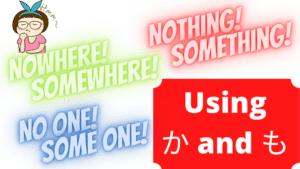
If you are a beginner and you know the question words, adding the か and も suffixes will greatly increase your working vocabulary.
Question Words
First, let's review the core question words:
Japanese | English |
|---|---|
なに | what |
どこ | where |
いつ | when |
だれ | who |
Need help? Click here for more on asking questions in Japanese.
か and も suffixes
If you know the question words above, let's give your vocabulary a boost with:
- か -
"some-"; adds uncertainty
- も -
"no -"; shows absence
か "some" Suffix in Japanese
The か suffix indicates "uncertainty": "some-"
Let's take the question words you know and see what happens when we add a か:
Question Words + か | Meaning |
|---|---|
なにか | something |
どこか | somewhere |
いつか | someday |
だれか | someone |
Do you see the pattern? Adding か creates uncertainty: some
Example Sentences
Let's look at a few example sentences:
なにか something
何か食べましょうか?
nanika tabemashou ka?
something | eat | let's
Shall we get something to eat?
どこか somewhere
先生はどこか知りませんか?
sensei wa dokoka shirimasen ka?
teacher | as for | somewhere | do you know?
Do you know where the teacher is?
いつか someday
いつか日本にいきたい。
itsuka nihon ni ikitai.
someday | Japan | to | want to go
I want to go to Japan someday.
だれか someone
だれか助けて!
dareka tasukete!
someone | help (me)
Someone help me!
も "no" Suffix in Japanese
The も suffix adds the "no" meaning.
Now, let's take the question words you know and see what happens when we add a も:
Question Words + か | Meaning |
|---|---|
なにも | nothing |
どこにも* | nowhere |
いつも | always** |
だれも | no one |
* The に indicates "at": "at no where"
** the いつも seems to be an exception to the rule, but really, if you think about it, "always" is "not any day." いつも can mean "never" with a negative verb.
Example Sentences
Let's look at a few example sentences:
なにも nothing
私は、何もわからない。
watashi wa, nanimo wakaranai.
I | as for (me) | nothing | understand
I don't understand anything.
どこにも no where
こどもは、どこにもいない。
kodomo wa, doko ni mo inai.
children | as for | no where | not
There aren't any children around.
いつも always
いつもありがとう。
itsumo arigatou.
always | thank you
Thank you always.
だれも no one
パーティーにだれも来ませんでした。
pa-ti- ni daremo kimasen deshita.
party | to | no one | didn't come
No one came to the party.





